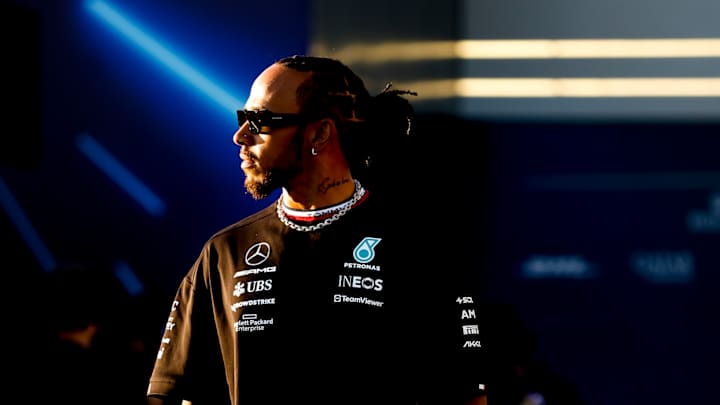F1 News: Lewis Hamilton Argues Against Change After Challenging Qatar GP Conditions

As opposed to the popular opinion, Mercedes driver Lewis Hamilton holds a different view about the extreme conditions all F1 drivers faced in Qatar. He believes that F1 should continue racing under extreme heat in the future to encourage the sport to not become "too soft."
The deadly combination of high temperature and high humidity made the conditions extremely tough for most drivers. Aston Martin driver Lance Stroll reported that he almost passed out due to the heat while Williams driver Logan Sargeant retired early on in the race. The list of drivers facing multiple adversities and receiving medical attention is a long one.
Listen To The Latest Driven Mad Podcast Episode
After the ordeal, the FIA announced that it would "take all reasonable measures to establish and communicate acceptable parameters in which competitions are held." But, Hamilton, who scored a DNF in Qatar had a controversial opinion. He told Skysports F1 ahead of the United States Grand Prix:
"I'm going to be controversial as always.
"Obviously I didn't do the race, so didn't get to feel the pain that the drivers felt. But I have obviously been here a long time.
"Malaysia was much hotter than that race and I know what it's like to lose four or more kilos in the race and barely being able to stand afterwards.
"My feeling towards it is... this is an extreme sport. You don't have marathon runners who are passing out after the marathon, saying you have got to make it shorter.
"This is an extreme sport and we are paid very highly for what we do and from my perspective when I've not been feeling great at the end of the race, I've just got to train harder and that's how it's been for me."

The British driver even cited examples of F1 in the 1980s and 1990s, including the fainting of Nigel Mansell when he pushed his car to the line at the 1984 Dallas Grand Prix.
"I don't personally want them to shorten the races and make it easier for us. I want it to be extreme.
"I want to feel the difference, I want to feel pain in my body, I want to be able to, hopefully with that extra bit of training that you put in or that extra bit of dedication that you have had, helps you get that extra lap and win that race. That's what this is about.
"We have got to be careful how we move with changes. We have got track limits and all these big runoff areas. Back in the (Ayrton) Senna days, you go over the kerb, it's grass and you pay the penalty. It's like, 'let's not get too soft!'
"Of course, if I was in the race, I would have struggled to get out afterwards also. But, I love that. That makes it closer to what it was back in the day, where Mansell was passing out after a race - this is extreme and we are supposed to be elite athletes and to be elite, you need to be pushing to the limit."
EXCLUSIVE: Johnny Herbert On Max Verstappen Dominance, Sprint Races, And Extreme Qatar Conditions
While the sentiments of former drivers Martin Brundle, Gerhard Berger, and Johnny Herbert echoed with Hamilton's, his teammate George Russell's viewpoint differed strongly.

